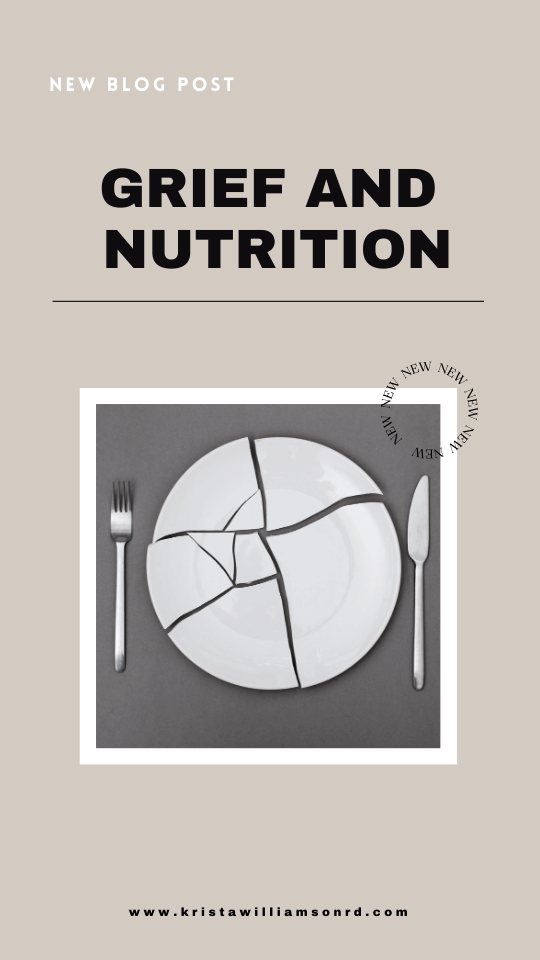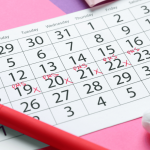
Nutrition & Grief
March 6th, 2024

Losing someone we love can profoundly impact every aspect of our lives. Loss can lead to intense emotions like sadness, stress, shock, or guilt, and what is impacting you emotionally also affects you physically. Many experience an ache in the pit of the stomach, heaviness in the chest, dizziness, shortness of breath, exhaustion, or the inability to sleep. Your immune system becomes compromised and you become more vulnerable to colds and infections and feel weaker. These are all reminders that your mind and your body are connected and they are common experiences during grief. Grief and loss can dramatically impact your entire life, health and well-being.
Note: I want to worry less about providing specific studies and research in this blog post and instead share a bit of my personal experience with grief and nutrition in the hopes that it can help anyone.
In this post we’ll cover:
- Grief, loss and your diet
- Loss of appetite
- Food as comfort
- My story

Hi, I’m Krista! I am a Registered Dietitian on a mission to show people how to feel better in their bodies without diets! Healthy eating shouldn’t be so restrictive + complicated. Instead, I preach balance. Eating balanced means nourishing your body and your soul so you can optimize physical health without sacrificing your mental health.
Grief, loss and your diet
Grief and appetite are closely connected.
Some people lose their appetite and begin eating less or struggle to eat at all. Others have an increased drive to eat or tend to find comfort in food, resulting in eating more than they usually would. Neither response is your fault. The impact grief and loss have on each person is different – and the same goes for how it relates to food.
Biologically, humans respond to threats with a stress response known as the “fight-or-flight”. During occasions of acute stress, this response is important for our survival. As a person reacts to the threat, blood is diverted away from non-essential organs (such as the stomach) and goes to the heart, lungs, and limbs enabling them to escape from danger. Then, as the threat ends and the stress response subsides, the body relaxes, and blood begins to return to other parts of the body, including the digestive system.
During grief, a person’s stress response is prolonged; they can grieve for months or years. Consequently, their bodies don’t return to the resting/relaxed state and instead can enter a state of chronic stress. This can cause inflammation around the body and also means slower digestion and/or more difficulty with digesting foods. Therefore, during grief when a person’s digestive strength is compromised, it is important to consider what you are putting in your body. Harder food that requires more energy to digest, or foods that may cause gastrointestinal problems should be replaced with softer food or even liquids that are easier to digest. [If you are here and need help with this, DM me]
Food has multiple meanings in our society. It fuels our physiological need for nutrients and also has psychological and social aspects as well. Food fuels our body and it makes us feel good. It is a part of holidays, celebrations, community or cultural events, traditions, and simple things like your morning routine, or getting together with a friend. Grief and loss can alter the psychological and social aspects of food, causing overall, negative effects on a person’s food and nutrient intake.

Loss of appetite
In grief, there are a variety of reasons why you may not feel like eating, here are some:
- You’re finding less joy in things – you may lose interest in activities and things you previously enjoyed, which can include food
- You forget to eat – emotional distress makes it more difficult to focus and grief can be distracting
- Food doesn’t sound appealing – research shows it’s very normal to lose your appetite
- You lack the motivation to eat or cook – you’re often mentally and physically exhausted and all self-care tasks can feel difficult
- Food or cooking reminds you of the person you lost – leading to more sadness you may be trying to suppress
Here are some tips for dealing with loss of appetite while grieving:
- Set up alarms/reminders on your phone to eat at least 3 times a day. Consider adding a snack time too. Reminding yourself to eat at 7 am, 12 pm, 3 pm and 6 pm (for example) reduces your need to expend your mental energy on when you ate last or when your next meal is.
- Buy pre-packaged foods, meals, and snacks – so all you have to do is open it, and/or heat it and then eat.
- Eat what you can. Now is the best time to ignore all of the nutrition misinformation online. If your apple isn’t organic, your beef isn’t grass-fed and your ramen doesn’t have any vegetables in it – it’s okay. All foods will provide your body with energy.
- Take a multivitamin and set another reminder to take it daily. It can help you get the vitamins and minerals you need that your diet may not be providing right now. (*Always speak to your healthcare provider or Dietitian before adding supplements)
- Ask for support from friends, family members, spouse, neighbours, etc. Perhaps they have the capacity and mental energy that you don’t have right now to bring you a meal or grab some groceries for you. Besides, you know you would do the same for them!

Food as comfort
In grief, there are many reasons why you may find yourself in a pattern of relying on food for comfort:
- Eating food makes us feel good. When we eat food, specifically carbohydrates, our brain releases dopamine which makes us feel good (temporarily). So it is no surprise that we tend to crave foods high in carbohydrates (ie. breads, sweets) for comfort.
- Food is always there for you, it’s available, stable and constant.
- It requires very little mental energy to open a bag, a box or a container of food.
- You may feel like nothing matters anymore or just don’t have the energy to care or change.
If you are feeling alone, like you’re broken, or there’s something wrong with you for relying on food for comfort, I want you to know that this response is biological.
If you’re feeling like you are stuck in a cycle that is feeling unhealthy, here are some tips:
1. Process your emotions, don’t try to distract from them, run away from them, or numb them with food. We were taught to always try to get rid of sadness – don’t be sad, always try to feel happy. But what if we just lived in sadness for a bit instead? It’s okay to feel sad. My therapist suggested I set a timer and allow myself to feel and process. Sit in the feelings, process, cry, journal, talk to a loved one, or do whatever feels best for you. Don’t suppress, express.
2. Be kind to yourself. The way you speak to yourself can help or hinder your processing through grief. Maybe you’ve never experienced this before or maybe you have and now you’re having to go through it all again which is making it that much harder. Either way, you deserve a whole lot of grace and kindness.
3. Create a joy list on your phone (another recommendation from my therapist!). If you’ve found you’re someone who is resorting to food for that temporary feel-good, take 5-10 minutes and build a joy list in your phone filled with other activities you could do that bring you joy. That way, when the craving hits, you have a list of other things that can make you feel good.
4. Try to “just eat“, don’t “eat and…” – eat and watch TV, eat and drive, eat and scroll on your phone. Sometimes when we don’t pay attention to the food we’re eating we don’t even taste it or enjoy it. The bag empties and then we want more because we didn’t even get to enjoy the food.

My story
*Trigger warning: infant loss, pregnancy loss.
I will speak to my situation mostly as it relates to lifestyle, nutrition and appetite.
For those of you who don’t know, our family lost our third son in December 2022. He was 25 weeks old. Without getting into the specific details, it completely rocked our world. Our living sons were too young to fully grasp it all at the time, but now, seem to understand a bit more about their brother living in heaven.
Shortly after experiencing our loss, our whole world felt like it stopped – while the rest of the world kept going. We were at home and I was basically always crying or trying not to cry, laying in bed, sleeping a lot, and trying to find any ounces of energy I could muster up to “be strong” for my boys here with me (I’ve since learned that trying to “be strong” was an unnecessary waste of energy). I couldn’t work, I wasn’t eating, I was barely moving, and I was struggling to care for myself or anyone else. In addition to the sadness I was feeling, every day I also felt an immense amount of guilt for not being an energetic or “happy” mom, for spending time laying in bed while my husband played with our kids, and for not knowing whether or not I was supporting my husband in what he was experiencing as well.
One of the biggest struggles for me was the lack of guidance after experiencing loss. I have lost other exceptionally special family members, but never an immediate family member, and never a child (I’m not saying it’s “worse”, just different). I left both the hospital and my OB’s office with no support in place. I wanted to start therapy, but I wasn’t provided with a list or even a single name of a therapist. I also didn’t feel like I had the capacity to google one – let alone speak to someone to book an appointment. It felt very isolating; like it was just me and my husband (who also hadn’t experienced this before) to figure it all out on our own.
Why is this happening? Why us? Why me? What am I supposed to do? Should I be off of work? How long can I be off of work? How often am I supposed to cry? How long is too long to lay in bed? What was I supposed to be doing to feel better? How am I supposed to take care of my boys? How am I supposed to take care of myself? How will I know if I’m healing?
Honestly, I spent months not taking care of my physical self – not doing any of the tips I mentioned to you above. For months, I barely ate (and if I did it was usually a container of ramen, frozen convenience food, or treats), I didn’t take my vitamins, I barely drank water, and I barely moved my body. I say all of this to let you know – I did not have my stuff together, and if you don’t right now it’s okay too.
several months later...
Several months went by before I decided that I needed to nourish my body better because I needed more energy and I needed to get rid of the headaches I was having.
So I set a reminder for myself to eat ‘brunch’ every day at 10 am. I ate a Greek yogurt parfait with fruit and granola or a Heavenly Hunk every single day. I didn’t have the mental energy to change it and that was good enough for me. Plus we continued having our dinner meal as a family (my husband was often preparing it, which I’m so grateful for, and it was mostly frozen convenience food). That gave me 2 daily eating experiences to provide my body with some nutrients.
Then over time, it grew. I added hydration, a snack and then a third meal. And I started to feel a LOT better – not in the way that took all of my sadness away – but in a way that got rid of my headaches and gave me energy. I started to accomplish small tasks I had set for myself like reading, moving my body, spending time outside, and making dinner for my family. I finally found a therapist I connected with.
I did progress forward from here, however, even with professional help, it was not a straight line of progress – and it still isn’t straight today.
I wanted to write all of this out in the hopes it can help someone else who is feeling in the thick of it, and leave you with this: what you’re doing right now is enough.
PLEASE NOTE:
All blog posts are written for general nutrition improvement and should only be used as a guide. This article is intended for educational purposes only and is not designed to diagnose, treat, prevent or cure any condition. It is not specific advice for any individual. Before adding supplements to your regimen, please speak to your healthcare professional.
other articles you may enjoy:
How to Build a Healthier Relationship with Food
What if we thought about food as nourishment for our...
Read MoreCycle Syncing: Align your nutrition and exercise to your menstrual cycle
Cycle syncing is a practice that involves adjusting our diet,...
Read More5 Simple Swaps to Boost Your Protein Intake at Breakfast
They say breakfast is the most important meal of the...
Read MoreOne-Pot Garlic + Lemon Chicken Orzo
If you make no other recipes of mine that's fine,...
Read More



